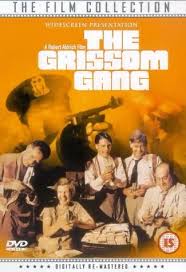
THE GRISSOM GANG
US, 1971, 128 minutes, Colour,
Kim Darby, Scott Wilson, Tony Musante, Robert Lansing, Connie Stevens.
Directed by Robert Aldrich.
The Grissom Gang was given almost non-release. Director Robert Aldrich's attempt to re-create and probe mid western gangsterism of the '30's is a partially interesting film. Over two hours long, it is patchy in characterisation, strong in expected melodrama. But it has its moments as psychopathic killer Slim Grissom (frequently over-played by Scott Wilson) is changed and partly humanised by his love for kidnapped heiress Barbara Blandish (Kim Darby). Period re-creation is good and the two final shootouts alarmingly well done. These gangs are now history and films like this make one wonder about their lasting impact on modern American society and attitudes. For those interested in this genre.
1. Does this seem an original kind of film or does it seem derivative of so many of the '30's Depression gangster films? Why? Even if it is derivative, does this detract from the success of the film?
2. How important was the re-creation of the 130's period for the film? The music, Rudy Vallee's singing, the cars, clothes and styles, rooms' and buildings' decor? Did this add to the impact of this film?
3. The film is very violent. Does the film exploit its style and violence for sensational box-office? Or is it an accurate enough representation of the violence of the times? What does the film say of violence and the American tradition? The effect of the Depression and people in need turning petty criminal and exploiting violence? Is this a message of the film or part of its background?
4. How central was Barbara Blandish for the film? Her place in society as presented at the opening of the film? Her wealth, her style, her snobbery, her fighting with her boyfriend? And then in being captured by petty criminals? What impact did this have on the audience? Identifying with Barbara and her imprisonment and lack of freedom?
5. What did the film show of petty criminals trying to be better than they were, suddenly involved in murder and not able to handle it? Was this convincingly done?
6. The importance of John for the film - as a hiding place for Barbara, for the petty criminals to get rid of her, for the Grissoms to capture her?
7. What were your impressions of the Grissom gang? Did they have any attractive features at all? Why were they repellent? They were petty criminals, thinking they were better than they were. Why were they so arrogant? Proud? How mad and fanatical were they? What motivated them for money and achievement? Their relationship to the Depression?
8. How interesting was the central character of Slim Grissom? How repulsive and mad was he? How did the film keep our interest in him? What motivated him? His being pushed by his mother? His relationship with other criminals, especially Eddie?
9. How well did the film communicate Barbara and her terror in being captured? The claustrophobia of being locked away? Her lack of communication with Slim? His fascination with her and playing with her as a toy? How frightening was this?
10. How horrible was Ma Grissom? Why?
11. The character of Fat? What did he add to the film? Did he humanize it in any way?
12. Eddie Hagen as a typical smart criminal? His self-opinion? His over-reaching himself? Was he in any way sympathetic? Why?
13. Why could such amateurs and petty criminals be so successful in Kansas of the '30's. Did the film make this credible? What does it say about American society of the Middle West at the time? That they could support such criminals?
14. Was Mr. Blanding any better than Ma Grissom? His paying the money and yet his hostility to the criminals and to Barbara? How repellent was he? Why? As a figure of the establishment? Was it credible why the Grissoms were against the establishment?
15. How did the film trace the gradual effect of Slim's looking after Barbara, on her? Why did she acquiesce to his suggestions? Did she feel sorry for him? Was it a human relationship between the two? The room that he set up in the club and its glossy and baroque effect? What comment was being made on Slim by this?
16. How intelligently was the police presented in the film? Dave Fenner and his investigations? Did this character give the audience a chance to get some objectivity on what was happening?
17. The importance of Anna Borg for the plot development? The pathetic nature of her response to a career in Hollywood? How moving? The irony of her being killed? As an example of the world in which the Grissoms moved and which they controlled?
18. Your reaction to the city shoot-up and the deaths? Were these credible?
19. The presentation of the siege of the Grissoms: as a parody of silent films and the cops, yet deadly in deaths? Was this the only way to kill criminals?
20. The presentation of death in the film? How callous and cheap?
21. The final confrontation of the police with Slim? The reality of their making love and it effect on him? Why was he prepared to die for Barbara? Were you shocked at Barbara's father being so unforgiving? How has this episode transformed Barbara?
22. Was this a helpful presentation of a rough period of America's history? Did it give insight into the people of the time? Did it have a serious purpose in the making or was it merely to capitalise on film trends of the early '70's. Why?